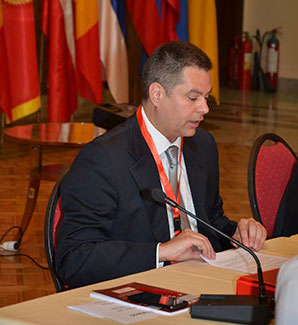
Wednesday, 20 may 2015
ADDRESS OF MR. ERIK CSERNOVITZ, CEI DEPUTY–SECRETARY GENERAL
I would like to express my gratitude to the Macedonian CEI Presidency and to the Parliament for the warm hospitality and organisation of this important event under this timely topic. The regional and cross-border cooperation have been attracting renovated interest during the last years, mainly because of macro-regional strategies launched at European Union (EU) level.
Thanks to its geopolitical situation, the role that the CEI is playing nowadays is a platform for European integration and a bridge between macro regions. Indeed, the CEI is in a perfect position to link the various macro-regions due to the high geographical coincidence: 1 country in common with the Baltic, 13 with the Danube, 7 with the Adriatic-Ionian and the 3 with the Alpine. Due to this high correspondence, in particular with the Danube and Adriatic-Ionian macro-regions, the CEI is ready to cooperate with the countries as well as with other interested stakeholders and participate in the elaboration of project proposals in line with the respective Action Plans, and for the ultimate benefit of the citizens. The CEI is actively involved in the EU Strategy for the Danube Region and holds regular consultations with its priority area coordinators in such areas as capacity building, sustainable energy, research and transport. It is also preparing the ground to actively participate in the implementation, of the EU Strategy for the Adriatic Ionian Macro-Region. The CEI stands ready to contribute to the implementation of each and every of them by participating in the relevant activities as a main stakeholder in view of the specific competences acquired in different fields, thus making a contribution to the removal of existing barriers and divisions hindering European integration. This is even more marked with the fact that such strategies do not envisage the creation of new institutional structures. Therefore, this is a great chance for the CEI and its structures, in particular its Secretariat, to become a key-actor in the strategies’ implementation. Ensuring synergies and complementarities through specific projects directly managed by the CEI will be the main objective.
Another reason behind CEI’s interest is the correspondence between the thematic pillars/priority areas targeted by both the EUSDR and the EUSAIR, and those included in the CEI Plan of Action 2014-2016. The CEI Plan of Action, agreed upon by all 18 CEI Member States in December 2013, addresses 13 areas of cooperation, grouped in 3 main pillars: a) towards a knowledge society; b) towards a sustainable economy and development; c) towards an inclusive society. It represents a roadmap of concrete actions that the CEI implements over these three years based on its project-oriented approach and fund management skills. The European perspective of its countries remains the CEI core mission. In order to accomplish it, the CEI is in tune with any scenario of development of regional cooperation, often in partnership with the EU and other international and regional organizations. In accomplishing its mission, the CEI can count on a well-functioning intergovernmental machinery, including a strong Secretariat, and on consolidated instruments and funds. That is to say, while remaining a platform for political dialogue and multilateral diplomacy, the CEI has developed a strong operational approach focused on supporting and the management of programmes and projects aimed at fostering cohesion and integration between and among its EU and non-EU countries. It supports a large number of projects and activities through its CEI Fund at the EBRD - thanks in particular to the extraordinary financial commitment by the Italian Government, through the CEI Know-how Exchange Programme - to which in addition to Italy also Austria contributes, as well as through the CEI Cooperation Fund, to which all Member States contribute. It also supports mobility of students, scientists, journalists etc. through specialised instruments and programmes. Moreover, the CEI participates in EU-funded projects both as Lead Partner and Partner, substantially engaged in the project design and implementation.
Moreover, the CEI specifically supports the idea of strengthening coordination with other regional organisations and initiatives on this matter. Indeed, the CEI has signed Memoranda of Understanding with a number of regional organisations such as with the Regional Cooperation Council, with the Organization for the Black Sea Economic Cooperation and with the Council of the Baltic Sea States, which include possibilities for cooperation with regard to the respective macro-regional strategies. A Memorandum of Understanding with the Adriatic and Ionian is also foreseen in the near future. The CEI receives strong encouragement also from Brussles to further develop its contacts and working relationship with the various Priority Areas and other regional and international organisations, since its experience and track record in capacity building and networking actions could represent an asset, especially for non EU countries.
Thank you.